#this is fully just me getting my feelings out as a dyke looking at paul iMFAJSDFJASDF
Explore tagged Tumblr posts
Text
i might be writing the most self indulgent thing i've ever written i can't even apologize about it
#this is fully just me getting my feelings out as a dyke looking at paul iMFAJSDFJASDF#you all better support me when i post this and understand that it's the furthest thing from straight sex a straight sex fic can possibly ge#bc i DO think just genderbending half of a gay ship to be straight is lame#but doing it and then shoving gender at them and making it queer again............. well SOMEONES gotta write it!
11 notes
·
View notes
Note
What are some of your favorite pieces of art/ art that has made you think a lot?
this is such a cheesy cop-out answer, but there's a lot of things that im going to struggle remembering because of 1. how situational the experience was (as in, the context in which i experienced the piece) 2. how wide the word "art piece" is. 3. the great fortune to have been born to parents with strong artistic sensibilities and a love of travel/education. so these are like. really weird and specific but maybe thats the way it should be:
let's start with the most overly dramatic: st. paul's cathedral in london has guided tours where they take you into rooms and let you mill around before moving to the next one. my family took a trip overseas as a really, really big special vacation to celebrate my sister and i graduating from high school (we're not twins, we just combo'd it after she graduated) that i was too brain-broken and teenage to fully appreciate. its a beautiful cathedral but i was in my edgy internet atheist stage and refused to be impressed by it until i stood over a grate in the floor. through the grates you can see the crypt that you visit next. but standing over the grate, someone below started to sing something hymnal and very catholic. and i realized i was the only one who could hear it because of the crowd chatter. and it made me feel, in the moment, so special and so lonely in a way that i still think about, a lot. it was for me only. divine providence.
a date with adam to a place i had no idea existed but he had been to before: the bad art museum, which is split over like 3 different buildings in a bizarre way. we only went to the one where you have to buy a ticket to a movie as entry and it was some truly lovely bad art and made me sad how inaccessible it was but resolute about my love of the nuances of uncelebrated anti-art masterpieces. then we watched "assassination nation" and it was fucking terrible. great date.
reading the theory regarding the "venus of willendorf" being a self portrait as a 20-something year old and running into the bathroom to take my clothes off and look down at myself and having my mind blown. not just by how much i instantly understood it, but because of the tugging feeling on my heart when i feel that strand of history connecting women artists driven by that unknown compulsion to create for creations sake!
similarly, seeing artemisia gentileschi's work next to her fathers and realizing how much she outclassed him in every single way and feeling the tugging feeling again, but this time with a dark woe of realization of how history minimizes achievement and talent when it eases a narrative
reading jane erye's descriptions of herself and her approaches to her plights and for the first time feeling like someone had walked a path that i currently found myself lost on.
reading 1984 as a middle schooler and becoming so angry at the ending i threw the book across the room (something i had never done before and never did again in my life) and stormed out of my room to complain to my mom lol. IT REALLY UPSET ME!!!
reading les miserables for the first time and weeping piteously for days after the ending and having it impact my brain so hard it re-wired how i think about the concept of "legacy" and what it means to matter in the world and how love is nothing without the courage to stand up for it. and that mercy should, and will, always supersede unwavering justice (hard lesson to remember, maybe im due for a re-read)
sneaking into my parents room to read the books i wasnt supposed to yet as a really little kid lol. my mom used to get "dykes to watch out for" in a newsletter she was subscribed to! but i didnt read those bc they were dumb relationship comics for grown-ups. i wanted to read about opus the penguin and lee iacocca, as if i knew who that was. my mother's comic collection was the single most influential constant in my life. knowing that i was exposed to bill watterson's commentary about his own work via the big collections my mom owned probably explains a lot about what's wrong with me. but she also had a lot of berke breathed before he fully wussed out
the general experience of playing a video game that you arent supposed to/when you arent supposed to is probably one of the most freeing means of meaningless rebellion as a kid that everyone should experience. i used to be up playing pokemon past my bedtime under my covers with a huge heavy rubber flashlight i stole from the kitchen and had to replace every morning without getting caught once i was done with it. god, the days before backlit screens we had to get really fucking wild with it. in high school i would wake up at 5:00am, sneak into the computer room where the ps2 was and play an hour of FFX bc its the longest fucking non-persona game in the world, stop playing before my mom woke up at 6:00am and sneak back into bed. if i hit a part where i couldnt save i would just turn the screen off and come back to it tomorrow lol. secrets......
reading the "pictures for sad children" arc about paul, who is a ghost, finally losing it and going on a rant about how it has never mattered how thin a computer screen is. they were right and reading it helped me articulate and understand a growing feeling of restless frustration at the world around me that i felt singular and alone in. im glad that last i heard that artist is doing ok. i hope they recognize the incredible value in their work as imperfect as they perceived it to be. i do not think they would be happy to know that their old work was impactful, but i hope they realize that what people are able to tease out of their work is meaningful, at least to me it is. ill transcribe the comic rather than repost it i think: paul [while smashing electronics]: "have i told you about [bam] how nerds destroy the world take conspicuous consumption as a lifestyle choice and combine it with early hardware adoption and you have great swaths of gadgetry out of stock because they're incrementally better than the last model and there are landfills full of functioning electronics wasted time, resources, money, etc. the best part is that these things were never necessary it has never mattered how thing a computer is." [smash]
this is too long. i like art.
66 notes
·
View notes
Text
Press/Gallery: How Elizabeth Olsen Brought Marvel From Mainstream to Prestige
“The thing I love about being an actor is to fully work with someone and try so hard to be at every level with them, chasing whatever it is you need or want from them.”
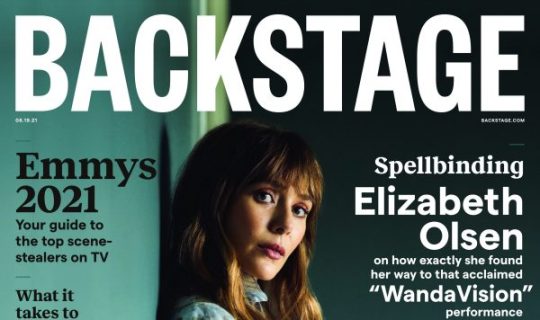
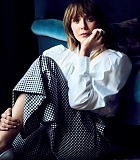
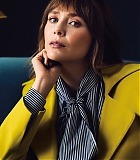
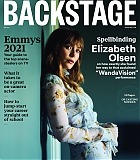
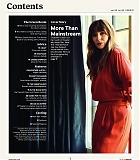
GALLERY LINKS
Studio Photoshoots > 2021 > Session 008 Magazine Scans > 2021 > Backstage (August 19)
Backstage: Elizabeth Olsen grins widely over video chat when recalling many such moments on set with her co-stars. Yet, she can’t bring herself to divorce such a lofty vision of film acting from the technical multitasking it requires. The camera sees all.
“But then you move your hair, and you’re in your brain, like: OK, remember that! Because I don’t want to edit myself out of a shot. I know some actors are like, ‘Continuity, shmontinuity!’ But the good thing about continuity is, if you remember it, you’re actually providing yourself with more options for the edit.”
That need to balance being both inside the scene and outside of it, fully living it and yet constantly visualizing it on a screen, feels particularly apt in light of Olsen’s most recent project, “WandaVision.”
The mysteries at the heart of the show grow with every episode, each fast-forwarding to a different decade: Could this 1950s, black-and-white, “filmed in front of a studio audience” newlyweds bit be a grief-stricken dream? Might this ’70s spoof be a powerful spell gone awry? Could this meta take on mockumentary comedies be proof that the multiverse is finally coming to the Marvel Cinematic Universe?
The series’ structure, which branches out to include government agents intent on finding out why Westview has seemingly disappeared, calls for the entire cast to play with a mix of genres, balancing a shape-shifting tone that culminates in an epic, MCU-style conclusion. What’s key—and why the show struck a chord with audiences during its nine-episode run—is the miniseries’ commitment to grounding its initial kooky setups and its later special effects-driven spectacle in heartbreaking emotional truths. It’s no small feat, though it’s one that can often be taken for granted.
“I was thinking how hard it would have been to have shot the first ‘Lord of the Rings,’ ” Olsen muses. “Like, you’re putting all these actors [into the frame] later and at all these different levels. All the eyelines are completely unnatural. And yet the performances are fantastic! And technically, they are so hard. People forget sometimes that these things are really technically hard to shoot. And if you are moved by their performance, that took a lot of multitasking.”
As someone who has learned plenty about harnesses, wirework, fight choreography, and green screens (she’s starred in four Marvel movies, including the box office megahit “Avengers: Endgame,” after all), Olsen knows how hard it can be to wrap one’s brain around the work needed to pull off those big, splashy scenes.
“If you think about it, it’s, like, the biggest stakes in the entire world—every time. And that feels silly to act over and over again, especially when people are in silly costumes and the love of your life is purple and sparkly, and every time you kiss them, you have to worry about getting it on your hands. Those things are ridiculous. You feel ridiculous. So there is a part of your brain that has to shovel that away and just look into someone’s eyeballs—and sometimes, they don’t even have eyeballs!”
The ability to spend so much time with Wanda, albeit in the guise of sitcom parodies, was a welcome opportunity for Olsen. Not only did it allow the actor to really wrestle with the traumatic backstory that has long defined the character in the MCU, but having the chance to calibrate a performance that functions on so many different levels was a thrilling challenge.
“It was such an amazing work experience,” she says. “Kathryn [Hahn] uses the word ‘profound’—which is so sweet, because it is Marvel, and people, you know, don’t think of those experiences as profound when they watch them. But it really was such a special crew that [director] Matt Shakman and [creator] Jac Schaeffer created. It was a really healthy working environment.”
Related‘WandaVision’ Star Kathryn Hahn’s Secret to Building a Scene-Stealing Performance ‘WandaVision’ Star Kathryn Hahn’s Secret to Building a Scene-Stealing Performance Considering that the miniseries spans several sitcom iterations, various layers of televisual reality, and a number of character reveals that needed to feel truthful and impactful in equal measure, Shakman’s decision to work closely with his actors ahead of shooting was key.
“We truly had a gorgeous amount of time together before we started filming,” Olsen remembers. “Our goal was—which is controversial in TV land—that if you wanted to change [anything], like dialogue in a scene, you had to give those notes a week before we even got there. Because sometimes you get to set, and someone had a brilliant idea while they were sleeping, and you’re like, ‘We don’t have an hour to talk about this. We have seven pages to shoot.’ And so, we were all on the same page with one another, knowing what we were shooting ahead of time.
“Matt just treated us like a troupe of actors who were about to do some regional theater shit,” she adds with a smile.
That spirit of camaraderie was, not coincidentally, at the heart of Olsen’s breakout project, Sean Durkin’s 2011 indie sensation “Martha Marcy May Marlene.” As an introduction to the process of filmmaking to a young stage-trained actor, Durkin’s quietly devastating drama was a dream—and an invaluable learning opportunity.
“It was truly just a bunch of people who loved the script, who just were doing the work. I didn’t understand lenses, so I just did the same thing all the time. I never knew if the camera would be on me or not. There was just so much purity in that experience, and you only have that once.”
The film announced Olsen as a talent to watch: a keen-eyed performer capable of deploying a stilted physicality and clipped delivery, which she used to conjure up a wounded girl learning how to shake off her time spent in a cult in upstate New York. But Olsen admits that it took her a while to figure out how to navigate her career choices afterward. In the years following “Martha,” she felt compelled to try on everything: a horror flick here, a high-profile remake there, a period piece here, an action movie there. It wasn’t until she starred in neo-Western thriller “Wind River” (alongside fellow Marvel regular Jeremy Renner) and the dark comedy “Ingrid Goes West” (opposite a deliciously deranged Aubrey Plaza) that Olsen found her groove.
“It was at that point, when I was five years into working, where I was like, Ah, I know how I want it. I know what I need from these people—from who’s involved, from producers, from directors, from the character, from the script—in order to trust that it’s going to be a fruitful experience.”
As Olsen looks back on her first decade as a working actor, she points out how far removed she is from that young girl who broke out in “Martha Marcy May Marlene.”
“I feel like a totally different person. I don’t know if everyone who’s in their early 30s feels like their early 20s self is a totally different human. But when I think about that version of myself, it feels like a long time ago; there’s a lot learned in a decade.”
Those early years were marked by a self-effacing humility that often led Olsen to defer to others when it came to key decisions about the characters she was playing. But she now feels emboldened to not only stand up for herself and her choices but for others on her sets as well.
“[Facebook Watch series] ‘Sorry for Your Loss’ I got to produce, and I really found my voice in a collaborative leadership way. And with ‘WandaVision,’ Paul [Bettany] and I really took on that feeling, as well—especially since we were introducing new characters to Marvel and wanted [those actors] to feel protected and helped,” she says. “They could ask questions and make sure they felt like they had all the things they needed because sometimes you don’t even know what you need to ask.”
It’s a lesson she learned working with filmmaker Marc Abraham on the Hank Williams biopic “I Saw the Light,” and she’s carried it with her ever since. “I really want it to feel like we’re all in this together, as a team,” Olsen says. “That was part of ‘Sorry for Your Loss’ and it was part of ‘WandaVision,’ and I hope to continue that kind of energy because those have been some of the healthiest work experiences I’ve had.”
If Olsen sounds particularly zealous about the importance of a comfortable, working set, it is because she’s well aware that therein lies an integral part of the work and the process. As an actor, she wants to feel protected and nurtured by those around her, whether she’s reacting to a telling, quiet line of dialogue about grief or donning her iconic Scarlet Witch outfit during a magic-filled mid-air action sequence.
“Sometimes you’re going to be foolish, you know? And [you need to] feel brave to be foolish. Sometimes people feel embarrassed on set and snap. But if you’re in a place where people feel like they’re allowed to be an idiot,” she says, “you’re going to feel better about being an idiot.”
This story originally appeared in the Aug. 19 issue of Backstage Magazine. Subscribe here.
Press/Gallery: How Elizabeth Olsen Brought Marvel From Mainstream to Prestige was originally published on Elizabeth Olsen Source • Your source for everything Elizabeth Olsen
#Elizabeth Olsen#WandaVision#Avengers#Scarlet Witch#Wanda Maximoff#Sorry For Your Loss#Avengers Infinity War#Avengers Age of Ultron#Captain America Civil War#Ingrid Goes West#Godzilla#Doctor Strange in the Multiverse of Madness#Marvel#MCU#Candy Montgomery#Love and Death#Avengers Endgame
48 notes
·
View notes
Text
Ranking Hulu’s ‘Into the Dark’ Series
Hulu made every horror fans dream come true by making Into the Dark. Every month they gave us a Blumhouse produced episode that was based off a holiday from that month! To be honest I reallynenjoyed all of them cause I love seeing fresh original ideas! I have been watching and ranking these and here it finally is! This post will have ***SPOILERS!!!*** and if you loved this season don’t worry, Hulu just ordered a second one! Enjoy!
12. The Body (Halloween)
The Body is funny at points but honestly it’s not good. Seeing as the theme was Halloween I just expected a lot fucking more! The concept of someone with a literal dead body acting like its part of a costume is smart but it just wasn’t executed well.
Director: Paul Davis
Writer: Paul Fisher & Paul Davis
11. Treehouse (International Women’s Day)
Treehouse was interesting but I don’t know something about it just wasn’t good. I mean I’m all for women getting much needed revenge but at points the film lagged a bit but I really did enjoy the cast in this one!
Director: James Roday
Writers: James Roday & Todd Harthan
10. They Come Knocking (Father’s Day)

Okay this one genuinely kind of scared me cause I had no idea what the fuck was going on but the mom coming back was um, TERRIFYING. Also like I wish Claire (Josephine Langford) was nicer to her little sister like stop being a bitch she’s GRIEVING.
Director: Adam Mason
Writers: Shane Van Dyke & Carey Van Dyke
9. I’m Just F*cking With You (April Fools Day)
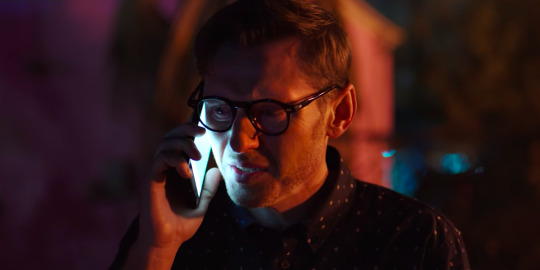
I liked this one because you never knew what the fuck was going on or what was gonna happen next but it’s also the reason I ranked it low. There was no rhyme or reason to it and I didn’t really like the ending I felt so bad! But, sometimes things don’t need to make sense to make it thrilling and that’s exactly what this episode’s about.
Director: Adam Mason
Writers: Gregg Zehentner & Scott Barkan
8. School Spirit (First Day of School)
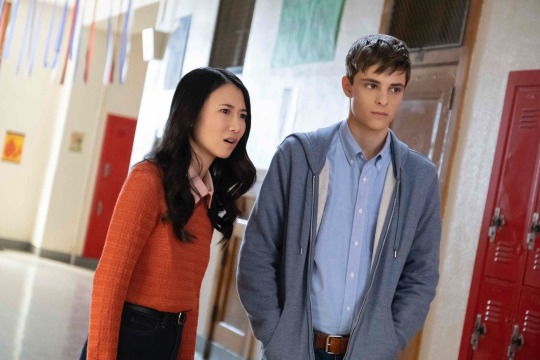
I’m a sucker for a school themed horror film and this little horrific breakfast club was a pleasant entry into the series. It was pretty obvious who the killer was and the story was cliche but the end is what kinda shocked me. Even though she went through complete hell, a boy should know not to get in the way of a girl trying to go Ivy! Also a great performance by Girl Meets World alum Corey Fogelmanis!
Director: Mike Gan
Writers: Patrick Casey, Josh Miller, and Mike Gan
7. Pure (Daughter’s Day)
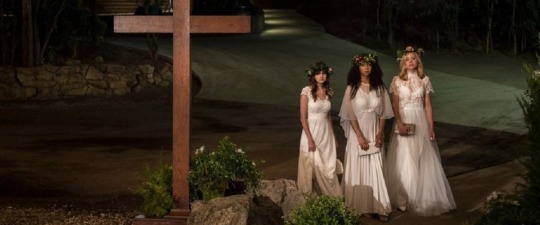
This episode was so fucked up but necessary! The fathers having that much control over their daughters is just so creepy and disgusting. I really wish this movie was more supernatural but I liked the message. Scott Porter was actually incredible as Pastor Seth and he made the episode. No one should be in charge of women’s bodies except women! Period!
Director: Hannah Macpherson
Story by: Paul Fischer and Paul Davis
Writer: Hanna Macpherson
6. Culture Shock (Independence Day)
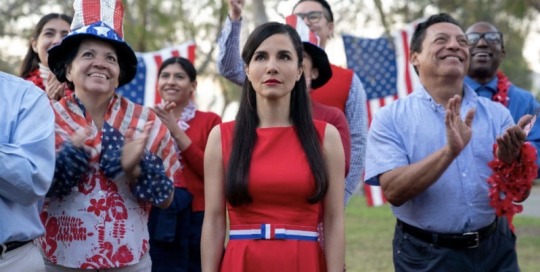
Culture Shock is my middle point like I didn’t dislike it but there’s a lot I did like. I hate Trump more than anything so I fucking absolutely hate that there are innocent people just withering away at the border. This film was good cause it showed how hard it is to get here and to fully live the American Dream even if that dream ends up being a nightmare. Also the concept of this episode sounds exactly like something Trump would do. I don’t blame Marisol for going back to Mexico, yeesh.
Director: Gigi Saul Guerrero
Writers: Efren Herenandez, Gigi Saul Guerrero, and James Benson
5. Pooka (Christmas)
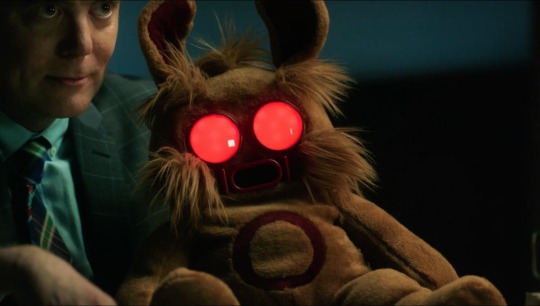
Ok now these nest episodes were my favorite of the bunch and I know people are gonna be mad that I put Pooka so low but this is MY list okurrr!? Pooka reminded me so much of a Black Mirror episode. I liked how it didn’t spell anything out and left you with your imagination to figure out what the fuck just happened. Also why were those people buying that stuffed animal for their kids like it LOOKS and sounds creepy as fuck!
Director: Nacho Vigalondo
Writers: Gerald Olson
4. All That We Destroy (Mother’s Day)

A mother would do anything for their child especially their son and that’s more than true in this episode. I really loved this one because I thought it was such an original concept. It also really brings up the whole nature verse nurture debate. The cloning the girl to see what would happen was just so cool to me. The end had me wondering though was he the one buried in the backyard and the mom used his DNA to clone him when he was younger? I thought the cast was great but I’m also bias because I love Israel Broussard who’s also in Blumhouse’s Happy Death Day franchise which is lowkey my favorite horror franchise.
Director: Chelsea Stardust
Writers: Sean Keller & Jim Agnew
3. Flesh & Blood (Thanksgiving)

Honestly in this episode I felt so bad for Kimberly (Diana Silvers) like imagine being terrified of going outside and then you realize your fucking dad is a psychopath!? This episode really could’ve been a full length movies and the acting was just absolutely phenomenal.
Director: Patrick Lussier
Writer: Louis Ackerman
2. New Year, New You (New Year)
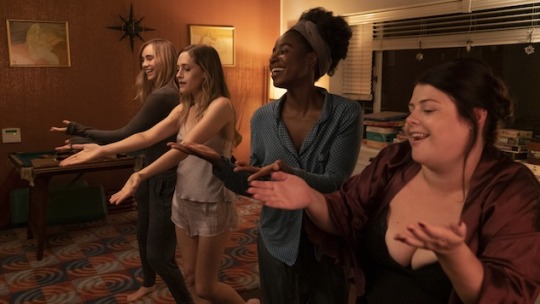
New Year, New You was the episode that got me into the show in the first place. I love Suki Waterhouse so I was eager to watch this! I genuinely did not think they invited Danielle (Carly Chaikin) over to terrorize her but they really were tryna tell home girl how much she fucking sucked! I loved loved loved the end of this movie and how Alexis (Suki Waterhouse) turned it around and made a profit off of the tragedy. You go girl!
Director: Sophia Takal
Story by: Sophia Takal & Adam Gaines
Writer: Adam Gaines
1. Down (Valentine’s Day)
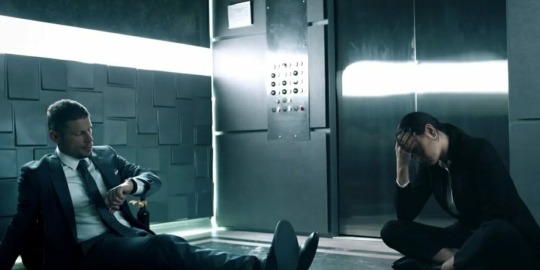
Down is the best episode because the entire time you’re just captivated. I liked this message cause women can do nothing and guys feel they have the right to be with them. The way he stalked her and then thought she owed him something boiled my blood! Thankfully Jennifer (Natalie Martinez) was smarter than John (Matt Lauria) and got amazing final girl revenge. My only thing is, did he have to kill his friend and his girlfriend?!
Director: Daniel Stamm
Writer: Kent Kubena
#happy death day#TATBILB#to all the boys i've loved before#into the dark#into the dark hulu#suki waterhouse#blumhouse#blumhouse productions#happy death day 2u#israel broussard#hulu recommendations
57 notes
·
View notes
Link
When Queerness Is Cultural Capital, Lesbians Go Broke. June 27, 2017 There’s a video going around social media this Pride month: the ABCs of the LGBTQA. It says “those six letters will never be enough…” while smoke in every color of the rainbow swirls around a multicultural dance troupe. The video, produced by an expensive gym franchise, is further proof that Pride has been fully co-opted by identity capitalism. A is for ally, aka a straight person who identifies as woke. E is for exhibitionist. H is for heteroflexible. K is for kink. What I learned from this abecedarian of narcissism is that LGBT didn’t include enough people, so we added literally everyone else. We are witnessing an interesting cultural trend of inclusion so radical that it demands a catchall (I know I don’t have time to list out those 26-to-infinity letters): queer. What this viral Pride season commercial illustrates is that queer identity is about more than who you love or fuck. There’s no requirement to be homosexual, just to be open-minded. This whole thing is less about “labels” and more about the lifestyle attached to sticking a “Love is love” sign in your front yard. How did we get here? How did queer go from a slur, to a political slogan, to an identity, to this purposefully impossible to define denotation of the in-crowd? This marketing campaign? And where do lesbians fit? Do we get to sit at the cool kids table? Or should we return to our camper vans where we won’t inconvenience anybody with our folk music and our boring monosexuality? Cara, the former etymologist at Autostraddle, writes that queer comes to us from Old Scots, and its first recorded use was in an insult competition. Before 1508, its Old High German antecedents referred to strangeness or eccentricity. She writes, “According to the OED, “queer” first showed up on paper in 1508, in a transcription of “The Flyting of Dumbar and Kennedie.” Flyting, very popular in early 16th-century Scotland, was a public entertainment in which bards “would engage in verbal contests of provocative, often sexual and scatological but highly poetic abuse.” Whether as an insult or a synonym for not-normal, queer was only ever used to cast out those people deemed freaks, to bully anyone gender non-conforming, to rally the mob for a game of smear the queer. When the queer reclamation project began in the bullhorns and on the picket signs of gay liberationists, the purpose was to strike back against heteronormativity. “We’re here, we’re not like you, and we don’t want to be.” Or how about, “We’re here, we are what we are, and you don’t get to define normal anymore.” Judging by the mainstreaming of the term, queer is hardly considered derogatory to many in the LGBT family. Reclamation projects are not always so swiftly accepted. Women who’ve tried to reclaim “slut” (eg Slut Walk, slutshaming) have not successfully ended rape culture or the virgin/whore dichotomy. The difference between unsuccessful reclamation projects like “slut,” and wildly popular projects like “queer” is the degree to which not only the word can be normalized, but also the people who it is used to describe. It reminds me of that Weezer song, “everyone’s a little queer…” See “queer” as a term has become an umbrella that accommodates not only the type of sex you have and with whom, but also how you identify the sex you have, how you identify your personality, your aura, the ineffable je ne sais queer that may or may not be related in any way to your sexuality, or even the way you present yourself to the world, but simply some deeply held, internal feeling. You don’t actually need to share a common oppression or a common romantic or sexual behavior. You don’t need to share the common experience of gay bashing, having your Christian parents disown you, or any kind of homophobia. You also don’t need to share the experience of getting sweaty palms and weak knees when Rachel Maddow is on TV, or when K. Stew shows up in your Instagram feed. You don’t need to weep all through Carol because it’s the first time anyone made a mainstream movie about lesbians where nobody died in the end. That’s cool; I mean there is no homogenous experience of being gay, and not every lesbian shares with me those experiences I just described, so why should I mind that I have literally nothing in common with the genderfluid individual marching next to me at Dyke March, other than we both have short hair and only wear eyeliner when the mood strikes? The reason I mind is because queer, in functioning as a catchall, serves to obscure what it is about my life, my community, my partners, that I needed to learn to be proud of in the first place. Because for me and all the other lesbians I know, figuring out your sexuality is hard enough, but the real work is in accepting yourself, demanding acceptance from others, being willing to walk away when that acceptance is denied. Lesbians are women, and women are taught that we’re supposed to be sexually available objects of public consumption. So we spend a lot of time saying “No.” No, we won’t fuck or partner with men; no, we won’t change our minds about this; no, this body is a no-man’s land. Lesbian, straight or bi, women are punished whenever we try to assert a boundary. Queer as a catchall term makes it really hard for lesbians to assert and maintain this boundary, because it makes it impossible to name this boundary. The inherent boundary-less nature of queer as its meaning has morphed from an insult to an identity has not necessarily made more spaces for gay and lesbian people so much as moved the furniture around. I’ll give you an example. I recently moved to a new city and was hoping to start a group house to save on rent. I joined a Facebook group called Queer Housing. I made an ad looking for queer roommates, and what I got was a whole lot of messages like “I’m a cis guy and my nonbinary femme girlfriend and I are looking for a house where we can enjoy watching Ru Paul’s Drag Race with other queers.” OK. I was kind of hoping for a house that looks more like the group house in Dykes to Watch Out For than the episodes of the Real World where the token bisexual makes out with a heteroflexible girl while the guys egg them on. One where we have a common culture, common interests, and common cause politically. Meanwhile, lesbians (people who are, legal or not, discriminated against in housing, suffer with fewer job prospects and tend to make less money than straight men, will have one less cheap housing option because the str8s are in here taking up space. Oh but A is for Ally in Queer Land, right?). Yet again, space created by and for people marginalized by their sexuality is colonized by people who enjoy all of the benefits of heterosexual privilege. It’s really hard to talk about privilege — who has it and who doesn’t — in the paradigm of queer theory, because one’s self-perception is the basis of one’s standpoint, rather than one’s membership in a broader social class like man, woman, gay or straight. I witnessed a woman in a heated Facebook argument weaponizing her queer identity as the standpoint for why her word on queerness and queer rights should be the last. A gay man asked “does your queer identity include sleeping with someone of the same sex?” She responded angrily that her queerness was spiritual and deeply personal, and that she didn’t need to share the many ways in which she was queer. That’s fine, although no one asked you for a play by play of how you reach orgasm. While my lesbianism is also deeply personal and spiritual, it’s impossible for me to hide behind “well I don’t need to tell you in what ways I’m a lesbian.” I can’t walk down the street without some man telling me that I look unfuckable. I can’t hold my sweetie’s hand in public without some man yelling “Why don’t you let a real man try? I could fuck you straight, girl.” It was a choice to come out, but I come out again every day. I could pass for straight if I would let my hair grow a little longer and stop wearing such practical shoes, but as soon as people see the way I interact with the women in my life, they know. I don’t want to indulge in “binary thinking,” in setting up a dichotomy between homos and heteros. Of course I know for some people, sexuality is fluid, and for others, it is very fixed throughout their lives. Many straight people have confusing crushes or days of experimentation, just like gay people do. Lots of people find themselves all sorts of places on the Kinsey scale. Goddess knows I was all over the place before pitching my tent in Dykesville. Yet, queer is not exact enough for me. Maybe there have been parts of me that dabbled in polyamory and BDSM, but those parts are subcategories of my specifically lesbian experience. So who cares if every letter of the alphabet is celebrated during Pride? What do I lose when lesbian is lumped in with queer? Well, for starters, political cogency. Last I checked it wasn’t the kink bars or the swingers parties that the cops raided in the 1950s, it was the gay bars, and anyone caught there could be roughed up, thrown in jail, raped or molested by cops and guards with total impunity. When Mike Pence advocated for conversion therapy as a Congressman, he wasn’t targeting those people who like to be ball-gagged or beaten during sex. He and his cronies are coming for those of us who want to live that gay lifestyle (with and without ball gags). Theresa Butz didn’t get to explain the infinitesimal nuance of her identity to the man who raped and murdered her for having the audacity to live with her girlfriend. The violence that lesbians experience is specific to being lesbian, and the culture that lesbians enjoy is specific to being lesbian. Both ends of this, the good and the bad, are the stuff a movement is based on. Queer identity and queer culture both stop short of speaking to this lesbian experience. These days when I hear someone call themselves queer, I just assume that their sexuality is too complicated to understand without a liberal arts degree. Honestly, I don’t care. I only need to know what labels you use if we’ve both swiped right, or when I’m sending out the invites to the potluck where we plot the overthrow of the heteropatriarchy. It does annoy me though, that everyone who has ever watched “lesbian” porn, or had an asymmetrical haircut, or read The Ethical Slut is demanding a rainbow participation badge. It means the market for selling not-normal, edgy, cool-ness is bigger and more profitable to lifestyle brands. It means anyone who is not-normal, edgy or cool has something to sell. It’s actually OK to let your freak flag fly without calling yourself queer or joining our parade. You can be proud of the fact that you’re not the kind of person who would slur a homo in public, the kind of person who wouldn’t bat an eyelash when you see Abby Wambach kiss her girlfriend in the stands. Ally, exhibitionist, heteroflexible, kinkster, and so on, your pride is not the same as my pride. It’s OK that I’m different from you. It’s OK that you have more in common with straight people than with LGBT people. Then again, I probably just don’t understand the personal and spiritual aura of queerness you carry deep down."
0 notes